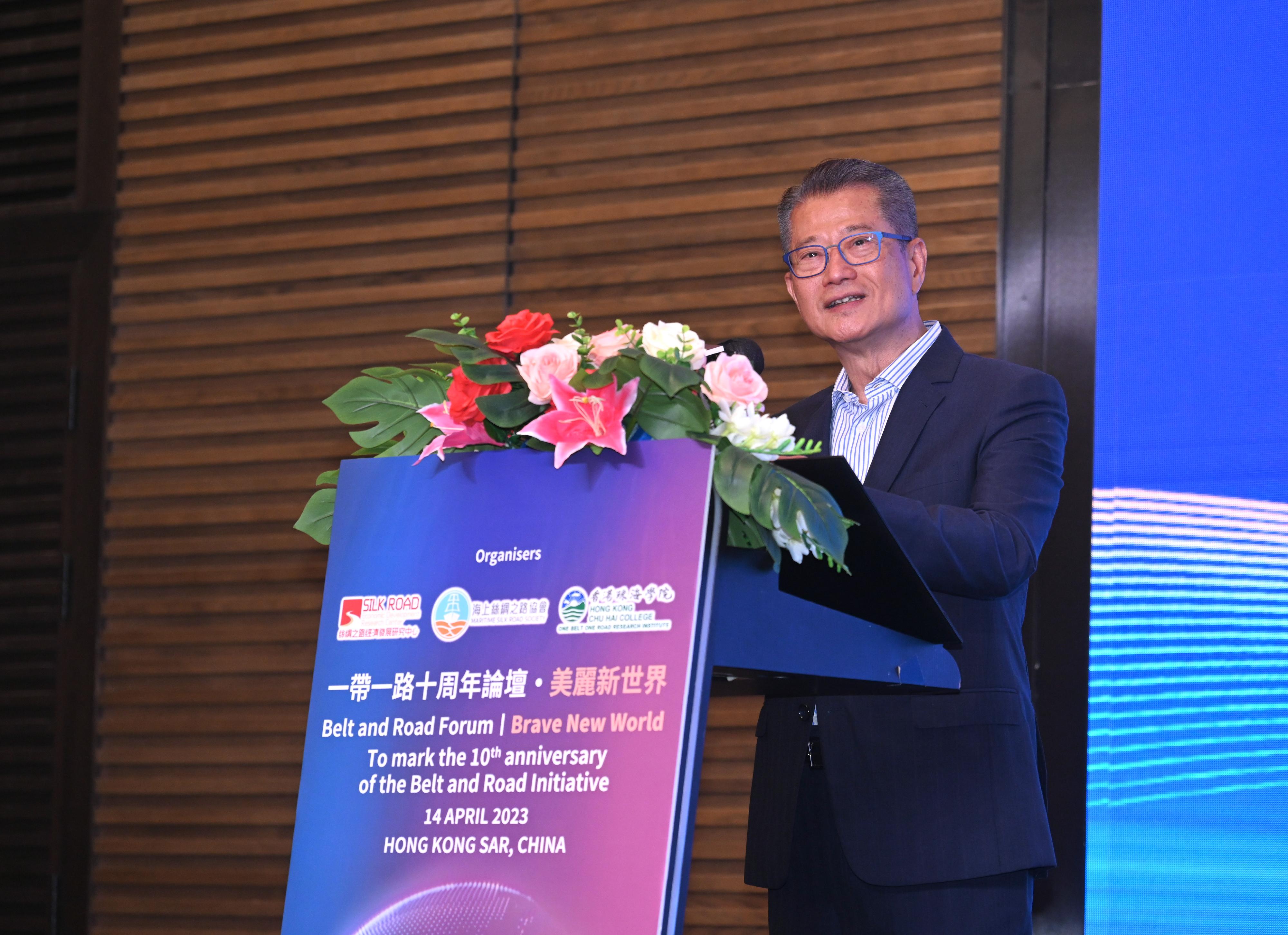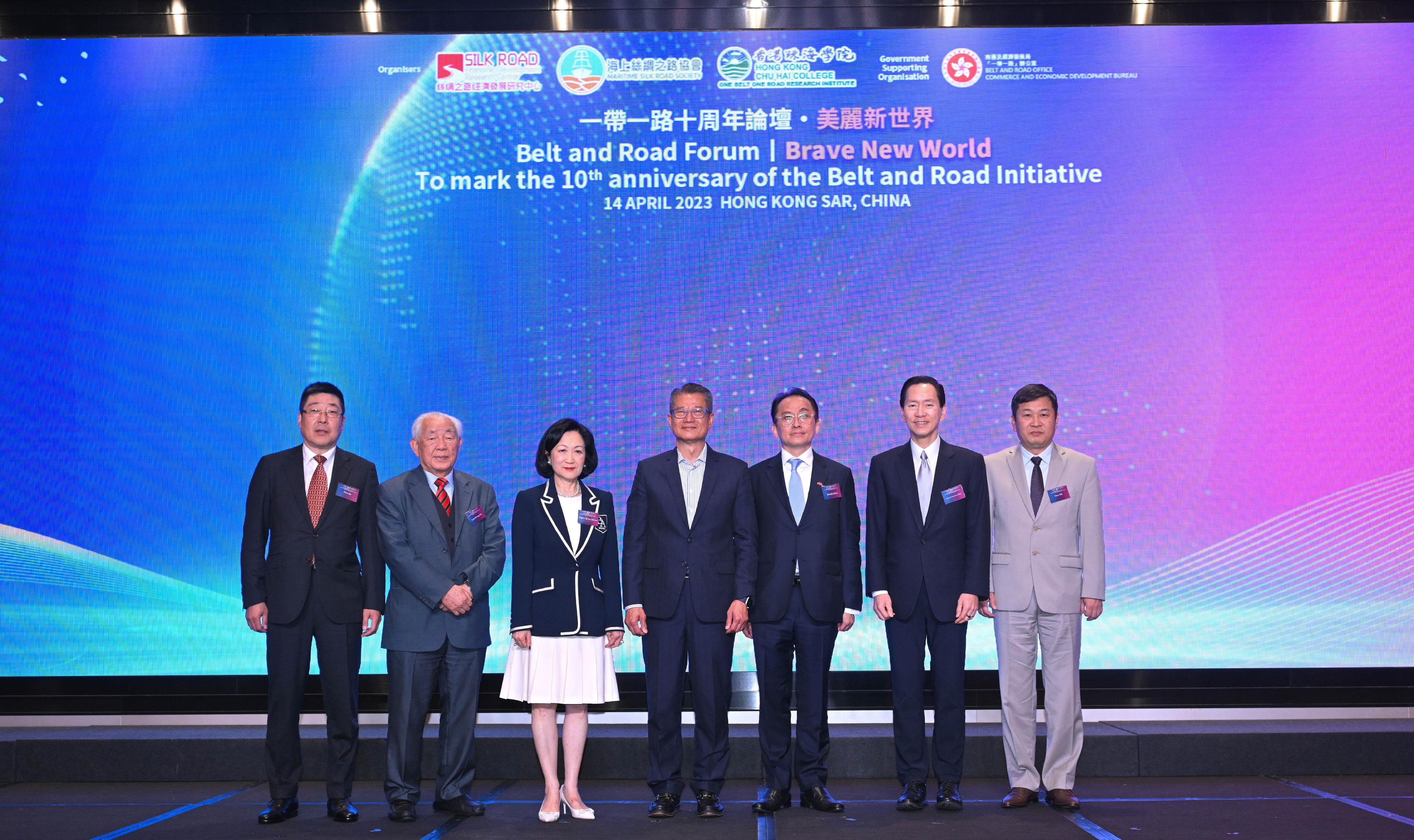Speech by FS at Belt and Road Forum: Brave New World (English only) (with photos/video)
***************************************************************************************
Regina, (Co-Chair of the Maritime Silk Road Society, Mrs Regina Ip), Bernard (Co-Chair of the Maritime Silk Road Society, Mr Bernard Chan), Your excellency Mr Vladimir Norov (the Director of the International Institute for Central Asia), Your excellency Mr Sihasak Phuangketkeow (the Advisor for Foreign Affairs at the Office of Thailand's Eastern Corridor Special Development Zone), Mr Joseph Chan (the Chairman of the Silk Road Economic Development Research Center), Professor Chen (the President of the Hong Kong Chu Hai College, Professor Chen Zhi), Consuls-General, distinguished guests, ladies and gentlemen,
A very good afternoon to you all! It gives me great pleasure to stand in for the Chief Executive to speak to you today. He has to attend some unforeseen urgent business, and he has asked me to relay his warmest regards to you all. This year is a remarkable year as we celebrate the 10th anniversary of the Belt and Road Initiative.
President Xi Jinping launched the Belt and Road Initiative back in 2013. This visionary Initiative is built on connectivity - in infrastructure, trade, finance and people-to-people bonds - here in Asia to the Middle East, Africa and far beyond. Its goal is clear and clearly laudatory: the achievement of common development and prosperity for all.
Some 60 economies came together a decade ago in pursuit of that goal. But today, more than 150 countries and 32 international organisations have signed Belt and Road agreements with the Mainland. Collectively, they account for about 40 per cent of the global GDP and 45 per cent of the world's merchandise trade.
And let me add that with the rising economic importance of Asia and the centre of economic gravity shifting from the West to East, the future of the Belt and Road is all the more promising.
Economists are expecting that the 10 countries of ASEAN are on the way to become the fourth largest economy in the world by 2030. Meanwhile, the Gulf countries, amid high geopolitical tensions and the financial turbulence in Western economies, are also looking to this part of the world to diversify their investments. They are very keen on collaborating with us.
This cannot be more explanatory than the impressive progress of co-operation. The annual trade volume between China and Belt and Road nations has doubled since the Initiative's inception, from around US$1 trillion in 2013 to more than US$2 trillion last year, with an average annual growth rate of 8 per cent.
Last year, despite the challenging economic environment, China's Belt and Road non-financial outbound direct investment increased by 3.3 per cent to about US$21 billion.
Increasing infrastructure connectivity among the Belt and Road countries is also bringing widespread benefits to participating economies.
Both Julia (Ms Julia Carlton, master of ceremony) and Regina alluded to the various mega infrastructure projects in Pakistan, in Southeast Asia and in Africa. I am not going to repeat them here, but they certainly signify some of the landmark initiatives set in motion by the Belt and Road Initiative.
Hong Kong is a participant, contributor and beneficiary of the Belt and Road Initiative. Under the "one country, two systems" principle, Hong Kong serves as a key link, a central connector, between our nation and the world. We are, as well, a functional platform for the Belt and Road, blessed with advantages that can make all the difference for Belt and Road economies and companies.
That certainly includes our diversified financial and professional services offerings.
Hong Kong, after all, is a premier fund-raising platform. Aspiring for faster and greater development as well as higher quality of life, many Belt and Road countries have devised ambitious infrastructure development plans.
Green transformation is a common project as the world heads towards carbon neutrality. Estimates have suggested that the gap for green funding in Asia would amount to US$66 trillion in the next three decades. This is a huge funding gap.
Hong Kong is Asia's premier green fund-raising platform. Our green and sustainable debt arranged or issued reached more than US$80 billion last year. They included multi-currency issuances involving US dollars, Euro, Renminbi and Hong Kong dollars, with various tenures of bonds up to 30 years.
Besides, in experimenting with the combination of fintech, blockchain technology and bond issuance, as well as increasing the efficiency of transactions, we issued the first ever government tokenized green bond in February this year.
What's more, Hong Kong also has strong greentech potential, where green start-ups with innovative technologies are already opening up their markets in the Belt and Road countries.
Synergising with the strengths of innovation in the Greater Bay Area, we see boundless potential for Hong Kong as a regional or even world green leader. That's why I have set out in my Budget to develop Hong Kong as an international greentech and GreenFi centre.
As Belt and Road countries re-centre their economic focus to the East, it can be expected that the use of Renminbi (RMB) as a trading and reserve currency will rise. Given China as the world's second largest economy, the use of RMB has ample room to grow in light of the current very modest share of the currency in the world's cross-border payments and as reserve currency - both at the moment being less than 3 per cent of the global total.
Hong Kong as the world's largest offshore RMB centre, and as a trusted international financial centre, stands ready to play an active role in the process, thus also helping with the internationalisation of RMB.
We are striving to enrich our RMB ecosystem and infrastructure and to roll out more products and risk management tools so that we will be able to address the investment needs of countries.
Our services sector is no less formidable, no less diversified. From feasibility studies and project management to architectural and engineering design, as well as legal services, risk management and many more, Hong Kong is the world's one-stop Belt and Road centre for professional services.
We have already set off to revitalise and renew Hong Kong's links with the Belt and Road countries to capture the enormous opportunities ahead. That includes visits to ASEAN countries and the Middle East by the Chief Executive and other senior government officials since October last year.
Our mission, let me add, was rewarding for all concerned. For instance, in the Chief Executive's visit to the Middle East in February, 13 business-to-business MOUs and co-operation agreements were signed.
I am confident that more financial, commercial and trade co-operation, and collaboration, will follow.
Business and investment aside, we are equally keen to advance connectivity with countries, and communities, of wide-ranging cultural and ethnic backgrounds.
We are blessed to have the full support of our country in emerging as an East-meets-West centre for international cultural exchanges. Realising that goal will demand surpassing connectivity, and creativity, with our Belt and Road partners.
And that includes welcoming talent from Belt and Road countries to Hong Kong. I am pleased to remark that since the launch of our various new or upgraded talent admission schemes since last December, the response has been overwhelming. We are glad to note that today's Belt and Road Forum puts a spotlight on Belt and Road opportunities and on talent, as well - on enticing professionals from these countries to look to Hong Kong for their future.
Of course, we would be glad to see our people, particularly the younger generation, to explore their careers and opportunities in Belt and Road countries as well. That means more people-to-people exchanges and business opportunities for Hong Kong. No doubt, the Forum today will consider how we can train, and retain, our own young professionals to help Hong Kong take full advantage of the promise that the Belt and Road offers.
For that, and so much more, my sincere thanks to the organisers of today's Forum: the Maritime Silk Road Society, the Silk Road Economic Development Research Center, and the One Belt One Road Research Institute of Hong Kong Chu Hai College
The Society has devoted much effort to promoting youth interest in the Belt and Road. For that, I am very grateful, and I look forward to the Society's continuing success in this important undertaking.
I wish you all a rewarding Forum and the best of business, and co-operation, along the Belt and Road. Thank you.
Ends/Friday, April 14, 2023
Issued at HKT 18:12
Issued at HKT 18:12
NNNN




